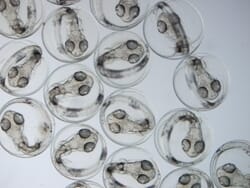Cod eggs were exposed to a temperature of either six or ten degrees Celsius, and were sampled at various stages of development from fertilisation until hatching. The results showed that there were major differences in development at the two temperatures.
“At a temperature of ten degrees, the eggs were less capable of regulating the antioxidant activity. This is a process that needs to be strictly controlled if embryos are to develop normally,” says NIFES researcher Kaja Helvik Skjærven.

The cod eggs were seriously affected by temperature stress at 10 oC. A higher temperature raises the metabolic rate of the embryos, which means that they grow faster and cells divide too rapidly. The faulty development process makes them weaker, which leads to higher mortality.
This study showed that the vital antioxidant balance was altered. We found that the expression of genes that play a central role in regulating the activity of antioxidants was weakened at high temperature.
Previous studies have shown that 6 oC is the optimal temperature for cod eggs. Global temperatures are rising, and in northern waters, the temperature of the sea surface temperature is predicted to increase by between 1.5 and 4 oC in the course of the next hundred years.
“Cod eggs are pelagic, which means that they float in the upper layers of the water column. This means that they are more likely to be affected than for instance herring eggs, since they develop at the bottom” says Skjærven.
Later stages of development can tolerate temperature changes better than the sensitive embryo stage. Any stress suffered at the embryonic stage cannot necessarily be compensated for at a later stage of development.
The study were published in Free Radical Biology and Medicine.




